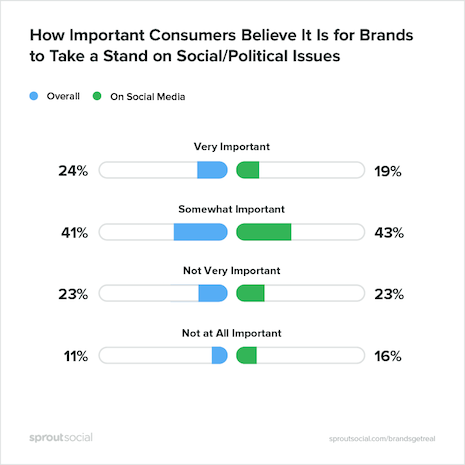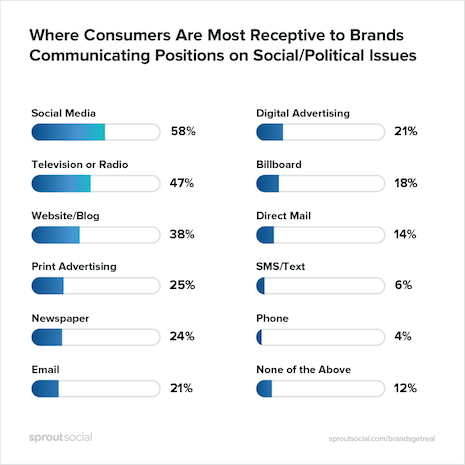 Still from "Writing with Fire," a film supported by Gucci's TriBeCa Documentary Fund. Image courtesy of Black Ticket Films
Still from "Writing with Fire," a film supported by Gucci's TriBeCa Documentary Fund. Image courtesy of Black Ticket Films
New research shows that consumers are more likely to be loyal to brands who share their core values on social issues, making luxury marketers' reliance on a philanthropic image highly important.
A study from Sprout Social shows that 44 percent of consumers are interested in purchasing products from brands when agreeing on important issues. With luxury brands often relying on word-of-mouth and public perception, they can harness this notion to stronghold a connection to their audience.
“Luxury brands have long been the masters of creating an emotional and personal experience for their customers,” said Andrew Caravella, vice president of strategy and brand engagement at Sprout Social, New York.
“People don’t buy a Tesla or a Hermès Birkin simply because they’re high quality products—they want these items because of the brand, what it stands for and what it says about their own beliefs and self-image," he said. “To that end and in similar application, luxury brands are uniquely primed to make their core beliefs on societal issues a component of their social strategy.
“With 61 percent of people saying it’s important for brands to take a stand on social media specifically, those companies that remain silent on the issues of the day may, in time, be perceived as behind the times or irrelevant.”
Sprout asked a surveyed a group of 1,022 United States consumers online for the report.
Social stance
While almost two-thirds of consumers believe it is important for a brand to share their core values, 58 percent believe that this can happen on social media.
Many marketers can be hesitant to embrace various social issues or take a stand for fear of alienating consumers who do not share the same beliefs, since today’s society is deeply divided on many issues.
But Sprout’s Championing Change in the Age of Social Media report shows that the reward is more than the risk with 28 percent of survey takers claiming they are likely to publicly praise a company for a positive reaction and only 20 percent for a negative reaction.
Chart regarding consumers' feelings on brands and social issues. Image credit: Sprout Social
The study also shows that liberals are more positively influenced by brands who take a stand compared to conservatives. Respondents who identify as liberals that hope for brands to take a stand make up 78 percent of the survey, whereas only 52 percent of self-identifying conservatives want marketers to take a stand.
However, the biggest impact is made with issues that directly affect a brand’s audience. More than 47 percent of consumers claimed they believe that marketers are more credible when commenting on an issue when it directly impacts them.
This credibility is extremely important when taking a stance on social issues, as consumers may call into question the brand’s motives if its relevance is not clear.
For instance, model and television personality Kendall Jenner starred in an ad for Pepsi that looked to create a commentary surrounding upheaval in the U.S. between African-American citizens and the police. Viewers believed it was dismissive and diminished the seriousness of the issue.
Labor laws and human rights issues are the top matters in which consumers want to see brands get involved. This could be because these companies have personal relationships to these issues and can also have a direct impact.
Social media users who see brands taking a stand on social media are mostly intrigued, making up 27 percent of the survey. The least popular reaction is becoming combative, at only 5 percent.
Social media users are interested in brands using social for political issues. Image credit: Sprout Social
About 24 percent of the survey said they would follow the brand if they agree with a stance that a brand takes on social media regarding a social or political issue. About 34 percent said they would unfollow a brand if they disagreed on its stance.
Consumers believe that the most effective ways for a brand to get involved on social media are to announce a donation, encourage followers to take a stand and to state the company’s official position on the issue.
Luxury and issues
Fashion and luxury brands are often making it their mission to connect to their audiences with a shared mission to support important social issues.
For instance, Condé Nast-owned British Vogue recently introduced readers to the Suffragettes of today in its February issue.
The women featured in British Vogue’s “Women of Influence” editorial spread are continuing the fight for equality, a century after the original Suffragettes movement marched for gender equality. From advertising campaigns to #MeToo and red-carpet dressing, female empowerment has been on the minds of influencers and consumers alike as gender-related societal issues come to the front (see more).
Also, Italy’s Gucci helped to bring stories of social issues to a broader audience through its Gucci Tribeca Documentary Fund.
Now in its tenth year, the partnership between the label and the Tribeca Film Institute has expanded its efforts for the recipients by linking with the Oath Foundation to support the films’ distribution and campaign strategies. Since launching the fund in 2008, Gucci and TFI have helped 83 films through a total $1.3 million in grants (see more).
“Some of the data that stood out was most focused on people’s willingness to take action—or inaction—as a result of brands taking a stand,” Sprout’s Mr. Caravella said.
“For example, we found that when an individual agrees with the brand’s stance, 44 percent say they’d purchase more from that brand going forward, 52 percent would show greater brand loyalty and 35 percent would recommend that brand to friends and family," he said.
“For luxury brands that often develop greater cachet through word of mouth, these potential benefits outweigh the risks when it comes to taking a stand on the issues that matter.”


